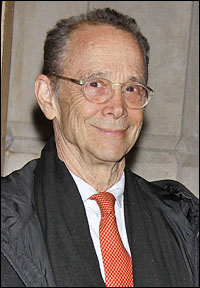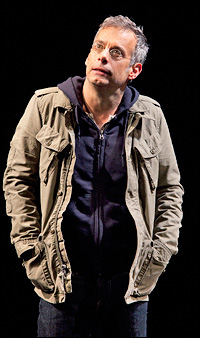
*
Larry Kramer's angry drama, The Normal Heart, about the frightening early days of the AIDS crisis in New York City, began downtown at The Public Theater in 1985, years before George C. Wolfe came and went as artistic director there. But it's somehow fitting that he was asked to co-direct the Broadway premiere of Kramer's play (sharing credit with Joel Grey, whose recent concert presentation inspired this production). Wolfe's connection to The Public's fearless tradition of politically charged plays made him a natural candidate. He also has a history with the leading man of the production, Joe Mantello, who played Louis Ironson in Wolfe's Broadway production of Tony Kushner's Angels in America (both parts). In The Normal Heart, Mantello — who, since Angels, has risen to become an A-list American director — plays the role of AIDS activist Ned Weeks, modeled on Kramer, who founded Gay Men's Health Crisis.
Under Wolfe, the Grey script-in-hand Normal Heart has been expanded to a full staging in a white-box set by David Rockwell, now at the Golden Theatre. Wolfe, Grey, Mantello and the production itself (along with featured players John Benjamin Hickey and Ellen Barkin) are Tony-nominated this year. Tears, laughter and a kind of mourning commingle in the venue eight times a week. We snagged a few minutes with Wolfe, who talked about the plangent emotion of The Normal Heart.
It occurs to me there's a whole generation that doesn't know what happened in the '80s at the dawn of the AIDS plague.
George C. Wolfe: Absolutely.
It's theatre's responsibility, in a way, to inform. Is that why you wanted to be involved?
GW: I think it's one of the reasons. I thought it was interesting: I thought, "Okay, we can help bring this story to young people who don't know certain information," and particularly there's a new crop of young people out there who are being foolish and reckless with their lives, and with their health, and I think that is happening in a very powerful way. But I think there is another phenomenon that is taking place, which is: it's allowing people who lived through that time to re-experience it, and to grieve, and to release, in a way. At one point, there's a line that Ned says, which is, "too much death," and I think those of us who lived through that time there was too much death, and a part of us shut down in order to survive. And going back and revisiting it now — because it's a play and the structure — it's allowing a release that wouldn't happen otherwise. We lost a generation of artists to AIDS.
GW: Absolutely! Totally. And you see it on Broadway. You see its effect on Broadway. Absolutely.
 |
||
| Co-director Joel Grey |
||
| photo by Joseph Marzullo/WENN |
GW: Joel did the concert reading, and the concert reading inspired and excited everybody who was involved to do the work. And then all of a sudden they found a [Broadway] theatre. At one point it was going to be a reading, and then it became very clear that it couldn't be a reading because it needed to be more to be competitive in the landscape, and Joel was tied up doing what he was doing, so they called me to get involved. So I liken it to, sort of, running a relay race, and Joel ran the first leg of the race, and then I took the baton and took over. So he wasn't in the room in a physical way, but his energy galvanized everybody and got it to a certain point.
It was a hand-off.
GW: It was a hand-off. Exactly.
I loved the stark white neutrality of the set, with headlines and words in white-on-white bas relief. The white obviously supports the projections. Do you like working in that kind of spare physical world?
GW: The thing I talked to [scenic designer David] Rockwell about is, I wanted to create the feel of an installation. I wanted it to be like a memorial to the fallen. So what's written on the walls is the history of AIDS in New York from 1981 to 1984. There are all these stories, and [the set spells out] the details of that. I wanted the environment to have a crispness so that the ferocity of the language and the fragility of the heart would be on display. I'm also not a big fan of realism. TV does it better, movies does it even better, you know?
We're the theatre.
GW: Yeah, we're the theatre, a place of ideas and imagination, so give me an abstract space and the specificity of the details.
 |
||
| Joe Mantello in The Normal Heart. |
||
| photo by Joan Marcus |
GW: Yeah, exactly. And self-loving, and doing what he does because he loves as much as he loves — he loves [his partner] Felix. And, also, he isn't a screamer, he's a person who's ferociously committed to what he's committed to and is fueled by fear and loss. What was your relationship with Joe Mantello like on this production?
GW: Well, we were recreating an old relationship because of Angels, so it was great to come back and revisit it because he became a director. Directors don't work with other directors, so it was nice for us to go back and be collaborators again.
It's a shorthand.
GW: Exactly, and when you direct somebody once — at least for me — it's such an intimate relationship, so it was nice to go, "Oh, are all those muscles still there? Oh, yes they are!"
Ned Weeks and Louis Ironson from Angels are cut from the same cloth. Also, I couldn't help thinking of Ibsen's noisy, moral leading character of An Enemy of the People. These men are all part of a literary tradition.
GW: Exactly. Exactly. It's a play that is fueled by politics but is also fueled by intimacy, and heart and toughness.
They're humans — they're not just ideas.
GW: Exactly. Fragile humans fighting a monster that is eating their friends.
What's coming up for you? Give me a scoop.
GW: I don't know… I can't… no scoop! No, no no, no, no…! Let's see... I'm doing a production of Little Mary Sunshine at an obscure theatre in Cincinnati, how about that? [Laughs.] But everybody is going to be naked! [Laughs.]
(Kenneth Jones is managing editor of Playbill.com. Write him at [email protected]. Follow him on Twitter @PlaybillKenneth.)











